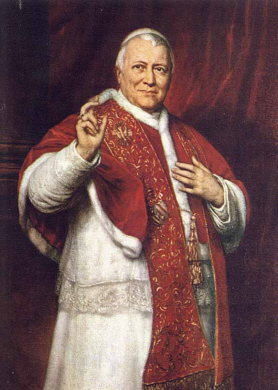First Vatican Council
Vatican I
 Pius IX, instigator of the council which affirmed his absolute authority within the Roman Catholic Church. | |
| RELATED TOPICS | |
| SERMONS, ESSAYS AND OPINIONS | |
| CONTENTS | |
The First Vatican Council was a council of the Roman Catholic Church held in 1869-1870 and become famous (or infamous) for confirming Papal Infallibility as official doctrine of the Roman Church.
The council was called by pope Piux IX. His two main purposes for calling the council were to define the dogma of Papal Infallibility and to obtain confirmation of the position he had taken in his Syllabus of Errors (1864), condemning a wide range of positions associated with rationalism, liberalism, and materialism.
In the three sessions, there was discussion and approval of only two constitutions: Dei Filius, the Dogmatic Constitution On The Catholic Faith (which defined, among other things, the sense in which Catholics believe the Bible is inspired by God) and Pastor Aeternus, the First Dogmatic Constitution on the Church of Christ, dealing with Roman primacy and papal infallibility.
The definition of papal infallibility was controversial, not necessarily because many did not believe the pope to be infallible when defining dogma, but because many who did so believe did not think it prudent to define the doctrine formally. John Henry Newman, for instance, thought such a formal definition might push away potential converts. Some feared it might lead to renewed suspicion of Catholics as having a foreign allegiance. This view was taken by two-thirds of the bishops from the United States and many from France and Germany.
About 60 members of the council effectively abstained by leaving Rome the day before the vote. Archbishop Antonio María Claret y Clará, confessor to the Spanish royal court and founder of the Claretians (Claretian Missionaries), strongly condemned the "blasphemies and heresies uttered on the floor of this Council," and was one of the strong defenders on the issue of papal infallibility and the primacy of the See of Rome. He was the only member of the council to be canonized as saint (beatified in 1934 and canonized by Pope Pius XII in 1950). He died in a Cistercian monastery in Fontfroide, France, in October 24, 1870. The discussion and approval of the constitution gave rise to serious controversies which led to the withdrawal from the church of the Old Catholics.
The outbreak of the Franco-Prussian War interrupted the council. It was suspended following the entry of the Italian Army in Rome, the so-called capture of Rome, and never resumed. It was not officially closed until decades later in 1960 by Pope John XXIII, when it was formally brought to an end as part of the preparations for the Second Vatican Council. The First Vatican Council marked the triumph of the ultramontanist movement, which supported a central Vatican-based government of the Church. An increasing awareness of their own identity among Roman Catholics worldwide was detected, and the numbers of converts to Catholicism as well as the numbers of vocations to the religious and priestly life increased, along with clearly pro-Catholic political activity of Catholics in their native countries. Along with this, a stronger involvement of laymen in the outward working of the Catholic Church evolved, and the council would indirectly lead to the stimulation of the Liturgical Movement, which would particularly flourish under Pope Pius X.
Quotes
Links
Return to Roman Catholicism
Note to users: The wiki is currently operating in safe mode. Editing is limited to users with certain privileges in order to deal with spam. You can create a new user account, and confirm your email ID in order to obtain ability to edit pages. Learn how to be an editor or sysop at WikiChristian.
- Sister projects: WikiMD.com Wellness Encyclopedia & Directory
- Sponsors: WikiChristian is supported by W8MD's medical weight loss and sleep centers.
